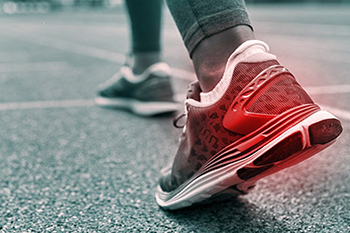
Shoes that do not fit well or those with high heels are a common cause of foot pain and can also lead to chronic conditions affecting other parts of the body. Athletes can prevent injury and pain by paying attention to a few tips that include making sure their shoes fit well and are supportive, selecting shoes that are appropriate for the activity to be done, and making any necessary adjustments to shoes prior to working out. It is important to pay close attention to shoe size and measure feet prior to trying shoes on. Feet swell as the day wears on, and shoe sizes vary across and between brands. Function and fit should be given precedence over fashion. Running shoes are different than hiking shoes and streetwear shoes are not the best for training. Different athletic shoes are developed to protect the areas of the feet that are most stressed by the activity. Shoe inserts, pads, or cups can be used in shoes to relieve chronic pain symptoms. If you enjoy running and want to continue your sport more comfortably, it is suggested you have your gait analyzed by a podiatrist. This healthcare practitioner can also observe any special adjustments needed for your shoes and advise on the best shoes for you.
If you are a runner, wearing the right running shoe is essential. For more information, contact Harvey Jacobs, DPM from Quality Foot Care Center. Our doctor can provide the care you need to keep you pain-free and on your feet.
Choosing the Right Running Shoe for Your Foot Type
To increase performance and avoid the risk of injury, it is important to choose the right running shoe based on your foot type. The general design of running shoes revolves around pronation, which is how the ankle rolls from outside to inside when the foot strikes the ground.
- Neutral runners are able to choose from a wide variety of shoes, including minimalist shoes or even going barefoot.
- Runners who overpronate, or experience an over-abundance of ankle rolling, should choose shoes that provide extra motion control and stability.
- Runners who underpronate, or supinate, have feet that have high arches and lack flexibility, preventing shock absorption. They require shoes with more flexibility and cushion.
If you have any questions please feel free to contact our office located in Somerset, NJ . We offer the newest diagnostic and treatment technologies for all your foot and ankle needs.
